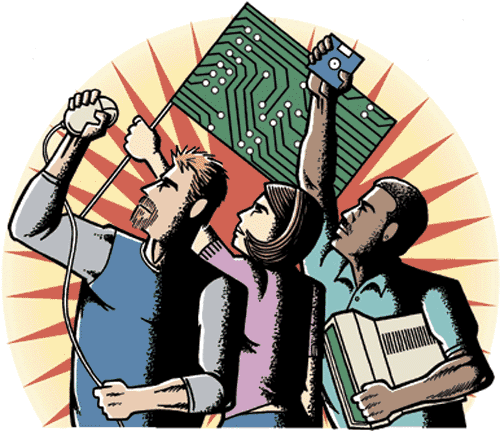rekaman pandangan mata dari sebuah diskusi virtual:
(translation is provided)
bayuni01: eh ci kone (eh katanya kamu) kirm pertanyaan ke kafedepok
bayuni01: sube cang jawabin (aku sudah jawab)
kadek_artha: pertanyaan ane ceeen? (pertanyaan yang mana)
bayuni01: sube... ketemu?? (udah.. ketemu?)
kadek_artha: suba2 (udah2?)
bayuni01: engkenn (gimana)
kadek_artha: hehe seberne ne pertanyannya riva
kadek_artha: dia ahlinya
kadek_artha: tpi ya cang agak ngerti bedik2 (aku ngerti dikit2)
kadek_artha: emang ada trade off
kadek_artha: antara incentive investment
kadek_artha: dan keadilan
kadek_artha: beneh sing? (betul ga?)
bayuni01: ngga harus
bayuni01: tergantung value si investor
kadek_artha: value investor kan jelas
kadek_artha: profit
bayuni01: kalo dia punya value bahwa the higest value not in the money
bayuni01: he is willing to invest to get the better health which is more valuable than money
bayuni01: but this is not the case anyway
bayuni01: :D
kadek_artha: menurut ci investor yg seperti itu siapa?
kadek_artha: menurut cang hanya pemerintah
kadek_artha: yg bisa lakukan itu
kadek_artha: oleh krn itu
kadek_artha: ada dua sumber investasi dr drug itu
bayuni01: maka itu kenapa pemerintah ga boleh keluar dari pasar
kadek_artha: hahahaha
bayuni01: kedek...:=)) (kok ngakak?)
kadek_artha: hahaha
kadek_artha: yen ada solusi pemerintah ne cang males (aku malas kalo pemerintah jadi bagian dari solusi)
kadek_artha: hahahaha
bayuni01: amen care ci engken.. (menurutmu bagaimana)
kadek_artha: tapi ada jalan lain yu
kadek_artha: misalnya dg lisensi
bayuni01: siapa yang dapat lisensi? siapa yang bayar?
kadek_artha: secara teori yu
bayuni01: ngga itu partially bener...
kadek_artha: nah main teori ni
bayuni01: cuma harus ada terusannya
kadek_artha: secara teori ramsey pricing
kadek_artha: sebenerne
kadek_artha: investor itu masih bisa diuntungkan
kadek_artha: krn
kadek_artha: sifat elastisitas demand dr obat
kadek_artha: di negara berkembang itu sgt elastis
kadek_artha: jdi
kadek_artha: harga obat di negara berkembang itu sendiri
kadek_artha: sebenerne jdi murah gitu
kadek_artha: artinya
kadek_artha: investor itu
kadek_artha: sebenerne
kadek_artha: masih bisa untung
kadek_artha: dg jual di negara maju
kadek_artha: yg relatif lebih inelastis sifat permintaanya
kadek_artha: dg dia menjual di dua pasar itu
kadek_artha: invetor sebenrnne sudah untung kok
kadek_artha: menurut kuuu
kadek_artha: tpi
kadek_artha: teori ini menjadi tdk relevan
kadek_artha: krn tdk bisa menangkap
kadek_artha: kejadian2 seperti di india
kadek_artha: yg mengcopy habis
kadek_artha: obat2 dr negara maju
kadek_artha: dan menjualnya dg harga sangat murah
kadek_artha: nah itulah
kadek_artha: maka TRIPS ditetapkan
kadek_artha: krn itu merusak pasar bgt
kadek_artha: dan lebih gawat lagi
kadek_artha: obat2 ituuuu
kadek_artha: oleh india
kadek_artha: di ekspor ke negara2 maju
kadek_artha: makin gawat lagi
kadek_artha: tdk fair kan jadinya
kadek_artha: ?
bayuni01: 1. obat yang elastis itu apa aja?
bayuni01: 2. kopi habis di india sudah dilakukan sebelumnya karena harganya sudah mahal, jadi ini reaksi yang wajar
bayuni01: 3. kalo ada trips maka yang mahal semakin mahal. pertanyaannya siapa yang untung?
kadek_artha: TRIPS juga reaksi yg wajar bukan?
bayuni01: 4. apakah fair kalo extract obat diambil dari NSB tanpa membayar apapun kemudian NSB harus membayar obat yanf dibuat dari tanaman yang tumbuh di wilayah mereka?? artinya NSB rugi 2 kali, perusahaan untuk 2 kali atau mungkin lebih
kadek_artha: hehehe
kadek_artha: begini yu
kadek_artha: tanaman diambil dr indonesia
kadek_artha: mislanya
kadek_artha: kalo gak ada pneliti
kadek_artha: dan ahli bidang obat yg tau kalo tanaman itu bisa jadi obat
kadek_artha: maka tanaman itu kan menjadi sekedar tanaman kan?
kadek_artha: yg mahal itu adalah membuat tanaman itu menjadi value
bayuni01: lalu siapa yang memberikan value mengenai indigenous knowledge? gampang dek, tahu subak (di bali) seandainya dia adalah cara yang efektif untuk irigasi lalu ada yang neliti kemudian menjadikannya resep untuk dipakai ke seluruh dunia, berapa value subak menurut mu? siapa yang kasih harga? apa dia tercermin ke harga pasar?
kadek_artha: oooh kalo subak itu beda
kadek_artha: iya juga sih
kadek_artha: tpi itu harus dipastikan dulu yu
kadek_artha: kalo misalnya itu hanya tanaman
kadek_artha: yg datangnya dan hidup dr Tuhan
kadek_artha: diteliti ama org luar
kadek_artha: nah itu tdk bisa dicerminkan dlm harga pasar
kadek_artha: kalo misalnya
kadek_artha: subak
kadek_artha: itu adalah sistem yg sudah dibangun
kadek_artha: maka aku setuju dengan kamu
bayuni01: sekarang berapa transaction costnya kalo mau informasi yang bener2 lengkap?
bayuni01: kalo perfect information, trips ga ada masalah. tapi information is unequal so..
bayuni01: nah sekarang sistem yang sdah dibangun, emang menurut mu orang yang menciptakan tidak mikir2? trus kenapa mereka ga diperlakukan seperti investor yang minta trips?
kadek_artha: merekanya gak minta
kadek_artha: hehehe
bayuni01: trus ga minta mereka ga berhak??
kadek_artha: begini yu
kadek_artha: kalo kita biacara adil kadang2 susah
kadek_artha: misalnya
bayuni01: trus kalo minta, jadi boleh?
kadek_artha: kalo org yg menemukan sistem subak itu
kadek_artha: sudah cukup bagi dia
kadek_artha: maksud ku
kadek_artha: ga masalah
kadek_artha: dia hanya mendapatkan apa yg dia dptkan
bayuni01: hahahaha
kadek_artha: trus kenapa harus dikasih
bayuni01: berarti pengusaha masalah kalo dia ga dapat trips
bayuni01: serakah dong...
kadek_artha: loh bukan serakah
kadek_artha: krn mereka rugi
kadek_artha: mereka perlu invest
kadek_artha: yg ngeluarin duit
kadek_artha: kalo subak
kadek_artha: kita gak tau siapa yg menemukannnya
kadek_artha: harusnya mereka berhak siiih
kadek_artha: tpi gini deh
kadek_artha: kembali lagi
bayuni01: trus subak ga pake uang, jadi ga berhak
kadek_artha: hahaha
kadek_artha: begini deh
bayuni01: trus kalo ga tau yang nemukan, kita pasrah
kadek_artha: bukaaan
kadek_artha: yg menemukannya juga diem kok
kadek_artha: hahaha
kadek_artha: begini aja yu
kadek_artha: maslah pricing
kadek_artha: memang cang sepakat ajak ci
kadek_artha: kalau memang tanaman misalnya diambil dr indo
kadek_artha: dan itu sudah ada yg menemukan bahwa tanaan itu obat
kadek_artha: maka perlu ada negosiasi diana
bayuni01: nah kalo diem kenapa ga dibuat supaya mereka klaim?
bayuni01: informasi dek..
bayuni01: siapa yang pegang informasi..
kadek_artha: trus bukan berarti
bayuni01: local punya informasi, investor juga datang untuk cari informasi? tapi informasi yang didapat kadang tidak di trade secara fair
kadek_artha: value dari informasi itu menjamin bahwa kalkulasi harga menjadi lebih murah kan
kadek_artha: di negara berkembang
kadek_artha: apakah value dr informasi itu tak terhingga?
kadek_artha: melebih cost dari org melakukan investasi?
kadek_artha: cost dr informasi itu juga perlu diperhitungkan cang sepakat
kadek_artha: trus bagaimana menilai value dr informasi itu
kadek_artha: kalo misalnya
kadek_artha: ada org indo
kadek_artha: ngasih tau
kadek_artha: 'eh disini ada tanaman bisa dijadiin obat tradisional
kadek_artha: misalnya
kadek_artha: nah berapa value dr informasi itu
kadek_artha: ?
kadek_artha: kalo misalnya yg memberi info itu diberikan uang 1 miliar
kadek_artha: tpi cost untuk membuat tanaman itu benar2 menjadi obat 3 miliar
kadek_artha: tetep aja kan
kadek_artha: ?
bayuni01: masalahnya apa bener informasi itu (atau lebih luas dibilang indigenous knowledge), di hargai segitu? masalahnya apakah info itu benar2 perfectly distributed? kalo iya, berarti informasi = price, tapi apa iya? kalo iya, aku setuju proposalmu.
bayuni01: prakteknya pertukaran informasi dilakukan pada situasi tidak seimbang, investor lebih tau suatu tanaman lebih bernilai dibanding tanaman lain. lalu orang lokal, apa punya info soal itu?
kadek_artha: nah
kadek_artha: krn org lokal gak tau
kadek_artha: artiya
kadek_artha: gak ada value informasi kan?
kadek_artha: yg harus dibayar oleh investor
kadek_artha: ?
kadek_artha: mungkin cang salah tangkep
kadek_artha: jdi sori
kadek_artha: hehehe
bayuni01: poinnya gini dek
bayuni01: kalo market itu bekerja sempurna syaratnya perfect information kan?
kadek_artha: iya
bayuni01: dalam hal ini informasi itu tidak dimiliki oleh pihak2 yang berkepentingan secara tidak merata. satu punya lebih banyak, satu punya sedikit bahkan tidak punya sama sekali. nah, disini sumber dari unfair trade. bagaimana kamu bilang fair ketika mereka menjual obat secara mahal, padahal mereka mendapatkan bahan2 atau informasi dengan cara murah?
kadek_artha: nah itu kembali lagi yu
kadek_artha: bagaimana kita mem value informasi itu
kadek_artha: kadang2
kadek_artha: loe bener
kadek_artha: informasi itu imperfect
kadek_artha: imperfectnya
kadek_artha: adalah
kadek_artha: seperti yg loe bilang tdi
kadek_artha: orang2 lokal
kadek_artha: tidak tau bahwa tanaman itu memeiliki value
kadek_artha: sedangkan org pintar dr luar tau
kadek_artha: nah
kadek_artha: siapa yg loe beri value lebih besar
kadek_artha: orn indo yg punya tanaman dan gak tau informasi itu berguna
kadek_artha: atau org luar yg gak punya tanaman
kadek_artha: tpi dia tau bahwa tanaman itu berguna
bayuni01: semuanya harus di value supaya fair. masalahnya kita undervalue dengan lcal knowledge
bayuni01: investasi harus di value, indigenous value juga harus di value
kadek_artha: iya kalo itu cang sepakat
kadek_artha: caranya gampang aja deh
kadek_artha: org dr luar pergi ke indo
kadek_artha: lihat ada tanaman
kadek_artha: nah org luar bilang
kadek_artha: eh
kadek_artha: ini tanaman bisa dijadiin obat
kadek_artha: bisa nyembuhin sepilis
kadek_artha: hehehe
kadek_artha: trus orang luar itu gak melakukan apa2
kadek_artha: kita bisa menilai kan berapa value nya?
kadek_artha: sekarang
kadek_artha: andai org luar itu melakukan research
kadek_artha: tanaman itu dibawanya ke pabrik
kadek_artha: ke labortorium
kadek_artha: di teliti
kadek_artha: kemudian dibuat jadi obat
kadek_artha: dengan kemasan bagus
kadek_artha: nah kita bisa menilai juga kan berapa value nya?
kadek_artha: menurut ci
kadek_artha: mana yg lebih besar?
kadek_artha: menurut cang
kadek_artha: cost dr investment
kadek_artha: research
kadek_artha: itu jauuuh lebih besar
kadek_artha: sehingga mau gak mau
kadek_artha: biar pengusah itu tetap untung
kadek_artha: harga menjadi tetap mahal
kadek_artha: solusi yg paling adil adalah
kadek_artha: negara2 seperti cina
kadek_artha: ato india
kadek_artha: kalo bisa research
kadek_artha: lakukan lah
kadek_artha: jgn mengcopy
kadek_artha: kalo bicara keadilan harus melihat dr semua pihak yg terlibat
kadek_artha: tdk hanya investor
kadek_artha: tpi juga org lokal
bayuni01: semua pihak yang terlibat, pertanyaannya mana yang lebih banyak secara jumlah? komposisi masing2 pihak secara total?
kadek_artha: oh kita gak bicara jumlah
kadek_artha: tpi kita biacara value
bayuni01: adil itu lebih baik dinikmati lebih banyak orang, atau dinikmati oleh yang sedikit?
bayuni01: dengan value yang sama jumlah yang diterima beda dek kalo jumlahnya beda, satu akan lebih sangat besar, satu lebih kecil
kadek_artha: gini2 yu
kadek_artha: yen ci kuliah (kalau kamu kuliah)
kadek_artha: ada anak ane belog (ada yang bodo)
kadek_artha: ade anak ane dueg (ada yang pinter)
kadek_artha: misalkan
kadek_artha: anak ane belog jumlahnya lebih banyak
kadek_artha: apakah kita harus memberikan nilai lebih besar
kadek_artha: bagi orang yg belog dan jumlahnya byk
kadek_artha: dibandingkan anak dueg
kadek_artha: menurut ku
kadek_artha: yg adil adalah
kadek_artha: kalo nilai yg belog itu 5
kadek_artha: maka berikan dia 5
kadek_artha: berapa pun jumlahnya
kadek_artha: yen nak dueg maan 8
kadek_artha: berikan dia 8
kadek_artha: walopun dia cuman satu org
bayuni01: berarti orang miskin ga bisa beli obat dibiarkan mati????
kadek_artha: untuk menjawab pertanyaan ci
kadek_artha: sebenrnya cukup menggugah kaum pasar seperti cang
kadek_artha: hahahahaha
kadek_artha: disinilah pemerintah berperan
bayuni01: nah jadi proposal ku bagaimana dek????
kadek_artha: pemerintah berperan bukan berarti TRIPS gak ada kan?
kadek_artha: TRIPS untuk investor
kadek_artha: pemerintah untuk org miskin
kadek_artha: udah
kadek_artha: adil dah
kadek_artha: pemrintah beri subsidi
kadek_artha: untuk pengusaha lokal punya lesensi
kadek_artha: sehingga harganya murah
kadek_artha: tpi tetep saja cang percaya
kadek_artha: intervensi pemerintah itu belum cukup
kadek_artha: tetep aja harus ada inovasi dr pengusaha lokal
bayuni01: itu yang aku bilang tambahan jawaban yang aku bilang diatas
kadek_artha: ah masa sih?
bayuni01:
Kadek Sutrisna: misalnya dg lisensibayuni01: siapa yang dapat lisensi? siapa yang bayar?Kadek Sutrisna: secara teori yubayuni01: ngga itu partially bener...Kadek Sutrisna: nah main teori nibayuni01: cuma harus ada terusannyakadek_artha: ooooh
kadek_artha: iya2
di akhir diskusi: kami bersalaman dari jauh..... (amsterdam-denhaag cuma seketik dua ketik aja ternyata hehehe)
 At the end of the year 2006, people begin to mark year 2006 as “The Year of Disasters”. I do not want to list natural disasters that occur in Indonesia during 2006. It’s too heartbreaking to know that even yesterday; there is another earthquake in North Sumatra and expert said it was only the beginning of a series of another earthquake. I send my deepest condolence for my brothers and sisters in Mandailing.
At the end of the year 2006, people begin to mark year 2006 as “The Year of Disasters”. I do not want to list natural disasters that occur in Indonesia during 2006. It’s too heartbreaking to know that even yesterday; there is another earthquake in North Sumatra and expert said it was only the beginning of a series of another earthquake. I send my deepest condolence for my brothers and sisters in Mandailing. 















